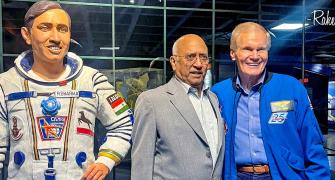'With India's growing capabilities in the space sector, this creates promising opportunities for enhanced collaboration and market access.'

The US billionaire Elon Musk owned SpaceX with its Falcon 9 rocket on Tuesday, November 18, 2024, put into geosynchronous transfer orbit the communication satellite GSAT-N2 owned by India's NewSpace India Ltd (NSIL).
This is the first launch of a satellite built by the Indian Space Research Organisation (ISRO) for NSIL for SpaceX.
Interestingly, Musk is close to US President-elect Donald J Trump.
Trump has appointed Musk -- who owns SpaceX and electric vehicle maker Tesla -- to lead the newly formed Department of Government Efficiency along with former Republican presidential candidate and businessman Vivek Ramaswamy.
SpaceX, now almost a monopoly in the global satellite launch market, has orbited small satellites built by Indian private players.
The question that pops up is how the cooperation between the two countries will pan out under the Trump administration in the space sector.
Musk, who was scheduled to travel to India in April 2024 and meet Prime Minister Narendra D Modi and also meet the heads of private space sector players, cancelled the trip.
As per the earlier agreements between India and the US, ISRO will launch the NASA-ISRO Synthetic Aperture Radar (NISAR) -- an earth observation satellite -- with its rocket from the Sriharikota rocket port in Andhra Pradesh.
NISAR is an earth observation satellite jointly built by NASA and ISRO. The satellite has already arrived in India from the US.
During Prime Minister Modi's visit to the US last year it was announced that America will fly an Indian astronaut to the International Space Station after necessary training.
Modi and US President Joe Biden called for enhanced commercial collaboration between the US and Indian private sectors in the entire value chain of the space economy and to address export controls and facilitate technology transfer.
In a joint statement then issued by the White House, Biden and Modi set a course to reach new frontiers across all sectors of space cooperation.
So will the two countries reach higher orbits in space sector cooperation under the Trump administration? And how do Indian private players in the space sector look at this development?
Comparing Modi and Trump's political outlook in brief, Tapan Misra, founding director and chief scientist, SISIR Radar Pvt Ltd, says both leaders are nationalistic and keen to revamp indigenous production of sophisticated technology products, including those in defence, space and mobile and satellite communication technologies to boost their economies.
"So, the natural outcome will be greater thrust on exports and restrictions of imports. That is where there is a potential source of conflict, both politically and economically. This conflict may result in technology denials, restrictions and tech import delays," says Misra, who was earlier director, Space Applications Centre, ISRO, Ahmedabad.
"I feel both countries will compete but also find common ground to together compete against other countries. Both of them will also find the gaps in each other's strengths and will co-operate to complement each other," adds Misra.
"We see further growth in this upward trajectory of cooperation in space which will take place in government to government and private to private space growing further," says retired Lieutenant General A K Bhatt, Director General, Indian Space Association.

According to Pawan Kumar Chandana, co-founder and CEO, Skyroot Aerospace, the last decade saw Indian-US space collaboration on an upward trajectory across different administrations, built on strong institutional frameworks and shared strategic interests.
The establishment of the working group for commercial space collaboration by Modi and Biden, along with the partnerships between ISRO and NASA on significant projects like NISAR and human spaceflight cooperation, demonstrates this strategic alignment, Chandana remarks.
Such collaborations are expected to strengthen further under President-elect Trump, particularly given that his previous administration recognised space as a crucial frontier by establishing the US Space Force and laying the groundwork for the Artemis programme, points out Chandana.
"Under President Trump's leadership, we anticipate greater emphasis on advancing space capabilities, from expanding satellite networks to furthering human space exploration. With India's growing capabilities in the space sector, this creates promising opportunities for enhanced collaboration and market access between our nations," says Chandana.
Talking about the cooperation/competition between the two countries in different space segments Misra says the satellite launch market is only 4% of the global space economy.
With the absence of the Ariane rocket owned by Europe's Arianespace, SpaceX has emerged as a leading launch player with 99% reliability and use of fully reusable heavy lift rocket technology.
"SpaceX achieves almost three launches per week whereas ISRO launches are barely six per year. Naturally per kg launch cost of ISRO is way ahead in comparison to SpaceX. I feel India will allow the US launch industry leeway as the technology gap is immense and market size is small," forecasts Misra.
As a matter of fact, ISRO's satellites play the catch-me-if-you-can game with its rockets. When ISRO created communication satellites weighing three tons, it had the PSLV rocket that could carry about two tons.
When ISRO developed the four ton GSLV rocket, its communication satellites weigh more than four tons and use other space agencies to orbit the same.
According to Misra, India will invest mostly in research and development to maintain strategic muscle and bargaining power in rocket technology.
"I do not see a great future in the private Indian launch industry until and unless we take a huge jump, bridging the gaping hole in technology," adds Misra.
Curiously, there are two Indian rocket start-ups -- Skyroot Aerospace and Agnikul Cosmos -- developing rockets to carry small satellites. Even here ISRO is present with its 500 kg rocket SSLV.
- 'Success of this launch is proof that Indian talent can have world class achievements'
- 'Space Transportation Has To Be Like Booking A Cab'
However SpaceX with its regular rocket launches offers attractive rates for small satellite owners to orbit their satellites as piggy back rides. A couple of Indian private satellite players have benefitted from this.
Misra, considered as the father of the RISAT series of Indian radar imaging satellites, believes India has the advantage of a great internal market in remote sensing and communication.
India has an advantage in satellite technology with demonstrated capability. If India plays its cards well, Indian private satellite companies can churn out sophisticated satellites at 10% to 20% of ISRO's cost in the next 5 to 10 years, Misra adds.
"Though today, the private satellite industry is just learning to walk, I will not be surprised India will emerge as a potential exporter in the satellite bus provided ISRO lends out helping hands to its private brethren," he says.
"In remote sensing technology India is at par with any other country in terms of system development and operationalisation. India is going to emerge as a strong player in remote sensing, both optical and radar based. I am hopeful that in the next 5 to 10 years, the Indian private space industry will emerge as a strong global player in remote sensing," says Misra.
India, Misra points out, was hitherto a strong player in space communication satellites.
"Unfortunately India could not envisage total reimagination of satellite communication by SpaceX Starlink and OneWeb, by integrating 5G with the LEO satellite constellation," explains Misra.
"This has put India totally on the back foot, obliterating the difference between mobile and satellite communication, making mobile towers and ground segments useless in another decade," adds Misra.
"Though mobile and Internet service will grow exponentially at very cheap pricing," he says, "unfortunately Indian players have to cede a lot of ground to US players. Indian planners and the private space industry need to throw up a strong competition in terms of the Indian version of SpaceX Starlink. Otherwise, there will be a dent in the communication service market," says Misra.
"Also the lead we have taken in the mobile handset market will be jeopardised," he warns.
Trump's accession in the US, predicts Misra, will see exciting times between India and the US space industries in terms of competition, cooperation and complementation.
"There will be some teething moments but business pragmatism will eventually take centre stage to ease our vexed issues," says Misra.
"If both the US and India play their cards wisely and pragmatically, the future is a win-win for both great democracies."
Venkatachari Jagannathan can be reached at venkatacharijagannathan@gmail.com
Feature Presentation: Aslam Hunani/Rediff.com









